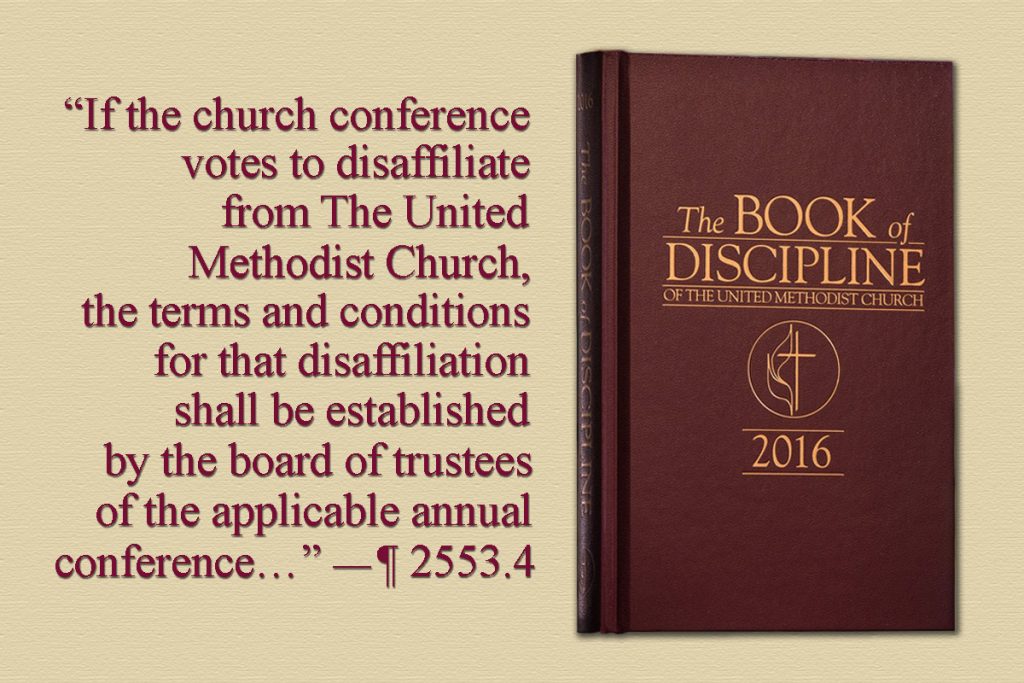Adapted from a UM News story
The United Methodist Church’s top court released nine rulings March 1 related to a church law that governs church disaffiliations outlined in paragraph 2553 of The Book of Discipline. Two of those rulings affirmed 2022 decisions made by Bishop John Schol that upheld the legality of the Greater New Jersey Annual Conference’s disaffiliation process, titled “A Call to Discernment and Renewal.”
In essence Bishop Schol ruled that the Board of Trustees of the Annual Conference has the authority to set the terms for a congregation leaving The United Methodist Church under paragraph 2553.
The Judicial Council also affirmed Bishop Schol’s ruling related to an Eastern Pennsylvania clergy member’s request for a ruling on legislation passed at the 2021 Annual Conference, which also related to terms and conditions for disaffiliation. The bishop ruled that the question was not proper based on polity and conference rules of order. The bishop’s ruling was affirmed by the Judicial Council.
The Judicial Council also affirmed two additional rulings by Bishop Schol from questions raised by a lay member in Greater New Jersey and unrelated to church disaffiliations. Bishop Schol was affirmed in both of his rulings.
The Judicial Council’s nine different rulings regarding disaffiliation all stem from questions raised about the Book of Discipline’s Paragraph 2553, approved by the 2019 Special General Conference in St. Louis. That church law offers a limited way and time period for congregations to disaffiliate, departing from The United Methodist Church’s centuries-old trust clause, which states that church property is held in trust for the benefit of the entire denomination.
In Decision 1460, the Judicial Council affirmed two decisions of law by Bishop Schol supporting the legality of the GNJ Conference’s disaffiliation process. GNJ’s terms and conditions include 17 items of due diligence, 13 required payments and seven other actions that a disaffiliating congregation must satisfy by the disaffiliation date.
In upholding Paragraph 2553, the Judicial Council specified that any disaffiliation must include:
-
- Approval for disaffiliation by at least a two-thirds majority of a church’s professing members present at the vote.
-
- Establishment of terms and conditions between the exiting local church and its annual conference’s board of trustees.
-
- Ratification of a church’s disaffiliation by a simple majority at an annual conference session.
Paragraph 2553 also says annual conferences — the denomination’s regional bodies — “may develop additional standard terms that are not inconsistent with the standard form of this paragraph.”
In its non-disaffiliation rulings, the Council’s Decision 1461 deals with the use of funds from the sale of closed churches and other church properties in GNJ. Judicial Council member Beth Capen added a separate opinion emphasizing that an annual conference “may not reallocate funds from the sale of church property except for those purposes and under those conditions” set forth in the denomination’s Book of Discipline and in compliance with local, state and federal laws.
Decision 1462 affirms Schol’s ruling that he does not have the authority to rule on the U.S. tax code. Decision 1463 agrees with Schol’s determination that a request he received during the Eastern PA Annual Conference was not a question of law.
The Rev. Dennis Blackwell, a Judicial Council member and GNJ pastor, recused himself from deliberating on all decisions involving Schol.
Read UM News’ entire story, which reports on other disaffiliation concerns and Judicial Council actions.

